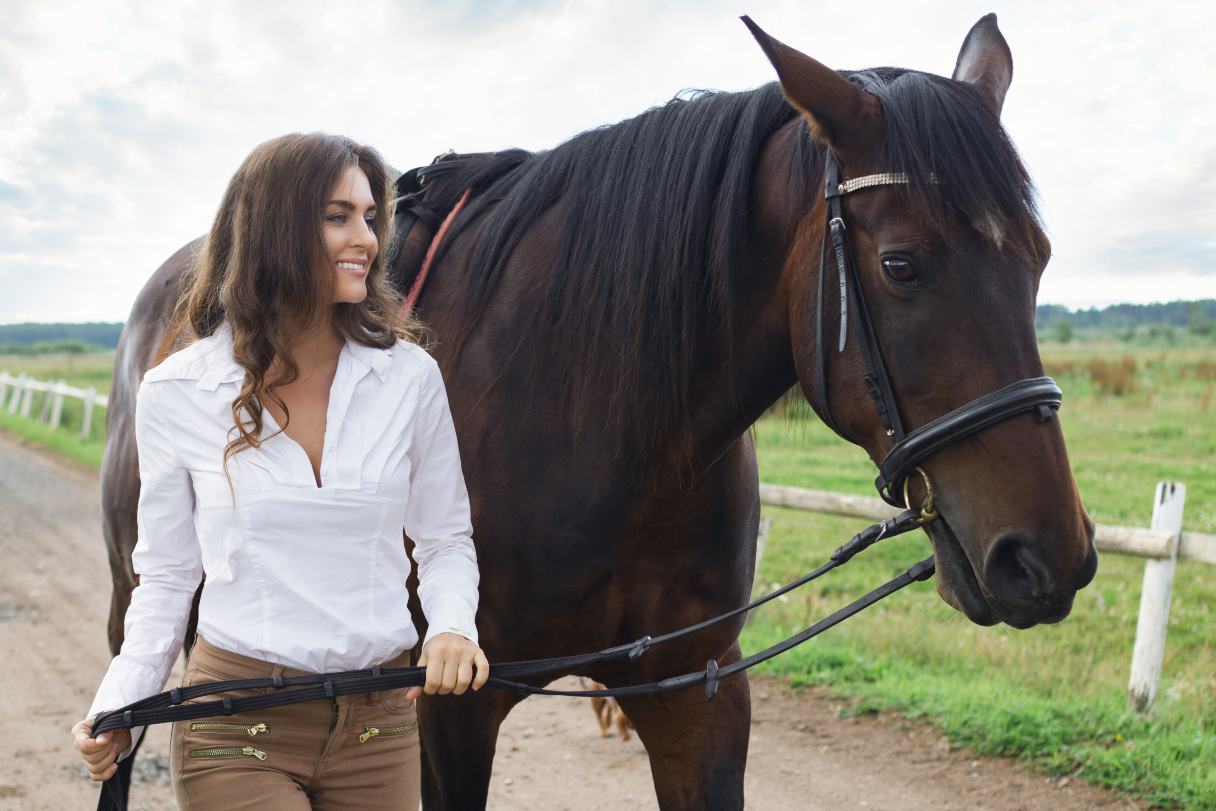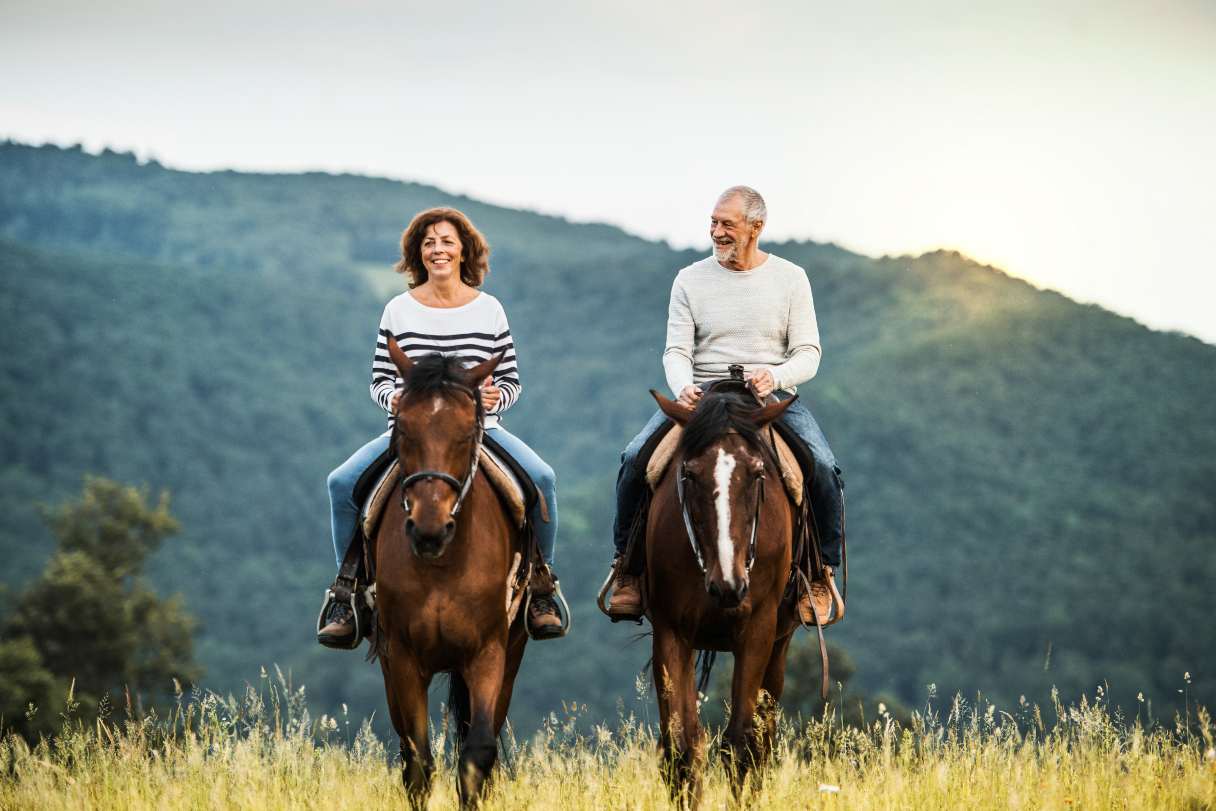Whether you’re new to riding or have been at it for some time, if your happy place is in the saddle, then owning a horse is probably at the top of your list of life goals. Horse ownership is a significant responsibility that requires a deep understanding of horse care, financial commitment and time investment. It's a decision that should be thoughtfully considered.
While the process of finding your perfect equine partner may feel overwhelming, remember that developing good horsemanship is a journey with no end — there’s always more to learn with horses. Read on to explore the realities of horse ownership and assess your readiness to embark on this rewarding journey.
1. Determine the Right Time to Buy a Horse
Before stepping into the stirrups of horse ownership, it’s important to honestly evaluate your goals, motivations and mental preparedness to truly determine if you’re ready to take responsibility for the welfare of an animal that could live into its 30s.
Ask yourself what horse ownership offers you that you can’t get from taking lessons or leasing a horse. Horses are a huge time commitment when it comes to feeding, cleaning, training and riding. Realistically, do you have the time and ability to care for your horse daily, given other commitments that might include work, school, family or other relationships? Do you have a plan for your horse’s care when you can’t be there?
Don’t worry if now is not the right time. There are many ways to enjoy horses while improving your skills, knowledge and overall horsemanship, including leasing, volunteering and lessons. Meanwhile, map out the steps you’ll take to eventually reach your goal of horse ownership.
2. Understand the Importance of Professional Support
It’s logical to think that the first step to horse ownership is to find the right horse. However, Dr. Erica Lacher, owner of Springhill Equine Veterinary Clinic in North Central Florida, recently joined the CareCredit podcast "Care Experts" and offered the following advice: “Finding a knowledgeable person to help bring you into the world of horses is the way to go."
Dr. Lacher recommends eager horse owners take lessons and learn about horses for a year or two before buying their first horse. "When they’re ready, I always recommend they get a professional involved," she says. "You don’t want to go find that horse on your own.”
Even before you start your search for the perfect equine partner, it’s a good idea to have a trusted support team in place that includes:
-
An experienced, licensed equine veterinarian who will conduct a pre-purchase exam on prospective horses, administer twice-yearly wellness exams and vaccinations, help with parasite control and take your middle-of-the-night call should an emergency arise. Your partnership with your vet will be your best source of information for keeping your horse healthy and thriving.
-
A reliable farrier to provide expert hoof care every four to eight weeks, including trimming, shoeing and managing any special hoof needs.
-
An equine dentist who will perform a dental exam at least once per year. Your veterinarian likely provides this service. If they don’t, ask them for a referral to a trusted professional. Horses have hypsodont teeth, which means their teeth continue to grow throughout their lifespan. A horse’s circular pattern of chewing allows their teeth to grind down, but an equine dentist will file any sharp points or edges — using a rotary tool in a process called floating — to keep their teeth aligned. Your dentist can also address any dental complications or developmental issues that could affect your horse’s long-term mouth health.
-
A skilled trainer to help you assess a prospective horse’s level of training and temperament as you try out different horses. A trainer who knows you and your riding level, your strengths and your challenges will be indispensable in helping you reach your riding goals.
Connecting with a community of riders, whether at barns, through clubs or online, can also be an invaluable resource for asking questions and getting advice from others who share your passion.
Learn more: Listen to this Care Experts podcast with Dr. Lacher (part one) on her recommendations for how first-time horse owners might start learning about these animals before making a commitment to caring for them.
3. Choose the Right Horse
Horseback riding is a team sport that requires good communication between horse and rider, so it’s essential you choose a horse suited to your temperament and riding abilities. Calm, well-trained horses are generally ideal for beginner riders because they’re better able to tolerate and adapt to a new rider’s nervousness or inexperience.
Consider the style of riding you'll primarily be doing: English or Western. Are you interested in competing or showing, or are you a pleasure rider hoping to hit the trails? English riders may advance to activities like dressage, jumping and eventing, while Western riders might pursue barrel racing, cutting, reining or rodeo events. Horses that are versatile and athletic can train in multiple disciplines.
Whatever your riding goals, a mature horse who has already been schooled in your chosen discipline is a safer choice for a first-time owner than one who needs a lot of training.
Dr. Lacher advises a pre-purchase vet check before finalizing any sale. "That's to make sure that there isn't anything hidden,” she explains.
A pre-purchase exam, conducted by a veterinarian at the buyer's request with the seller's consent, is a thorough physical evaluation of the horse’s health and temperament on the day of the examination. During the exam, a veterinarian will test the horse’s musculoskeletal, respiratory, cardiovascular, nervous, digestive and visual systems.1 They will examine the horse’s gaits, test for lameness and check the horse’s vaccination and deworming history. Some pre-purchase exams may involve X-rays of the horse’s front feet, hocks, stifles, fetlocks and spine, while others may include drug testing to ensure no findings are obscured.1
4. Build a Baseline Knowledge
As a horse owner, you’ll never stop learning, but you do need a foundational knowledge of the various aspects of horse care to keep your equine partner healthy and safe.
A working knowledge of equine nutrition will help you meet your horse’s specific dietary needs based on their age and activity level. Consult with your vet for advice on what kind and how much forage and grain (concentrate) your horse needs, as well as their vitamin, mineral and protein requirements. Dr. Lacher emphasizes that horses generally need to eat about 2% of their body weight in forage daily to maintain their health. For a 1,200-pound animal, that’s about 24 pounds of hay per day. They will also need a concentrate to balance vitamins, minerals and proteins missing from forage. The type chosen will depend on your horse’s workload and metabolism. Amounts fed vary strongly but are generally in the 1 to 5 pounds per day range.
Another important skill is understanding how to use the universal Henneke Body Condition Scoring System (BCS) to determine if your horse is over, under or at a healthy weight. The scoring system uses a scale from 1 through 9 — one being emaciated and nine being obese. The fat in six areas on your horse’s body are assessed: neck, shoulders, along the withers, across the ribs, the back and the base of the tail.
It’s normal for your horse’s weight to fluctuate somewhat based on their life stage, activity level, breed or pregnancy. But just as a too-thin horse isn’t optimal for their health, being overweight or obese can pose health issues as well, including laminitis, Equine Metabolic Syndrome (EMS) and joint and tendon injuries.2
Dr. Lacher emphasizes the importance of horse owners knowing how to take their horse’s vital signs: temperature, heart rate and respiratory rate. “You get us those three things, we know a lot about what's going on with your horse, and they're pretty easy to do," she says. During your veterinarian’s biannual visit, they can provide a demonstration on how to accurately measure these vital signs.
You should also be knowledgeable about basic emergency care, and keep a well-stocked first aid kit for minor injuries with items like bandages, antiseptic, wraps and scissors. In addition, you should be able to recognize and treat common conditions such as colic, ulcers, hoof abscesses, skin conditions, lameness and more, and know when to consult your veterinarian.
Lastly, have an evacuation plan in case of emergency or natural disaster. Know how to safely move your horse off the property, where you can take them and how you’ll transport them should the need arise. Practice loading and unloading your horse from a trailer so they’re familiar with the process and the mode of transportation.
5. Understand the Time and Care Commitment
Horses require daily care and attention, making them a time-consuming commitment. Here’s what’s involved in the day-to-day care of a horse:
-
Feeding. Horses need to be fed at least twice a day. This includes hay, grain and fresh water. If you’re boarding your horse, the stable may handle feeding, but if your horse is at home, you’ll need to manage this yourself.
-
Grooming. Regular grooming keeps your horse’s coat healthy and helps build a bond between you and your horse. Grooming should be done daily or at least several times a week.
-
Exercise. Horses need regular exercise to stay healthy. This can include riding, lunging or turnout in a pasture. Depending on your horse’s needs, this could be daily or several times a week.
-
Stall cleaning. If your horse is kept in a stall, it needs to be cleaned daily to remove manure and soiled bedding. This is essential for your horse’s health and comfort.
-
Health monitoring. Horses are prone to various health issues, so you’ll need to monitor your horse daily for signs of illness, injury or lameness.
If you plan to board your horse at a stable, factor travel time into your daily routine. You’ll also need someone who can care for your horse when you’re away from home or on vacation.
6. Evaluate the Financial Commitment
The initial cost of buying a horse is just the beginning and is often the least expensive aspect of horse ownership. It’s crucial to have an in-depth understanding of your budget and anticipate ongoing expenses that will accrue year after year.
Your expenses will include, but are not limited to, the following common categories:
-
Boarding or housing. If you’re boarding your horse at a stable, fees typically include a stall and stall cleaning with fresh shavings, hay, grain, water and basic care like blanketing. Other services — like turnout, administering supplements or medication, deworming and clipping — may be available for additional fees. Always ask what services are included in a boarding contract. If you plan to keep your horse at home, a sizable property is essential to accommodate their needs. At a minimum, you'll need a healthy pasture with secure fencing and some protection from the elements, such as a run-in shed. While a stall barn is a significant investment, it offers versatility, comfort and safety, especially in cold-weather climates. It's also important to remember that horses are herd animals who thrive in the company of other horses or companion animals like donkeys, sheep or goats. While a solitary horse can survive alone, having herd mates is crucial for their overall happiness and well-being.
-
Medical care. Regular vet checkups, vaccinations, dental care and parasite control are essential for maintaining your horse’s health. “Horses tend to be accident-prone or susceptible to certain conditions,” says Dr. Lacher. It’s wise to budget for unplanned vet visits each year.
-
Farrier services. Horses need their hooves trimmed every four to eight weeks. If your horse wears shoes, this will add to the cost.
-
Insurance. Many horse owners choose to insure their horses for major medical, mortality or liability.
-
Tack and equipment. Saddles, bridles, grooming supplies, halters, saddle pads, buckets, lead ropes, blankets, fly sheets and other tack and supplies add up quickly. Additionally, it's important to budget for riding clothes, including a helmet, riding boots, jeans or breeches, schooling shirts and gloves.
-
Training. As a new horse owner, working with a trusted trainer is an ideal way to improve your riding and horse knowledge and fine-tune your horse’s training to keep them motivated.
-
Travel and transportation. If you plan to show or compete locally or regionally, you’ll need to cover the associated expenses, which can include entry fees, groom, feed and stall fees. You may need to invest in show clothing and show tack required for your discipline. Many horse owners eventually purchase a truck and trailer to transport their horses, but you might also hire an outside hauling service.
-
Emergency fund. Set aside funds for unexpected veterinary bills, repairs to fencing or stalls or other emergencies. Having a financial cushion can reduce stress during emergencies.
7. Connect With a Supportive Community
Engage with other horse owners, join a local riding club or participate in equestrian events. Having a community of horse enthusiasts can provide support, advice and camaraderie.
“You need the support,” says Dr. Lacher, especially when questions arise that you don’t necessarily need to take to your veterinarian or trainer. "Maybe it's, ‘How do I pick my horse's feet out?’ or ‘How do you feel about that new saddle pad available?’" Dr. Lacher points out: "Having a community around you is so important and adds a lot to helping you care for your horse the best you can."
As a horse owner, you’ll be responsible for your horse's health and welfare for many years. “See if horse ownership is something that fits into your lifestyle in a full-time way,” says Dr. Lacher. “Choose carefully, practice good horsemanship and enjoy the journey,” she says, adding, “I will warn you — it’s an addiction!”
Learn more: Listen to this Care Experts podcast with Dr. Lacher (part two) for more tips on everyday horse care from investing in high quality food to joining a horse community.
CareCredit Credit Card Financing for Horses
The CareCredit credit card provides a convenient way to pay for your horse's health and wellness expenses, including exams, medications and products at providers in the CareCredit network.* Use our Acceptance Locator to find a veterinarian near you that accepts CareCredit to help keep your pet healthy and happy for a lifetime of love. CareCredit is there for you and your pet every step of the way; continue your wellness journey by downloading the CareCredit Mobile App to manage your account, find a provider on the go and easily access the Well U blog for more great articles, podcasts and videos.
In addition to pet care, you can also use your CareCredit credit card for dentistry, cosmetic, vision, hearing, health systems, dermatology, pharmacy purchases, spa treatments and so much more within the CareCredit network. How will you invest in your health and wellness next?
Expert Reviewer
Dr. Erica Lacher, D.V.M.
Dr. Erica Lacher is a 2001 graduate of the University of Florida’s College of Veterinary Medicine, and the owner of Springhill Equine Veterinary Clinic in Newberry, Florida. In addition to practicing medicine, she is also an author, blogger, and podcaster, with the mission of making the world a better place for horses.
Author Bio
Anne-Marie Kennedy is a freelance writer with more than 20 years of experience covering health and wellness, personal finance and real estate/investing.







